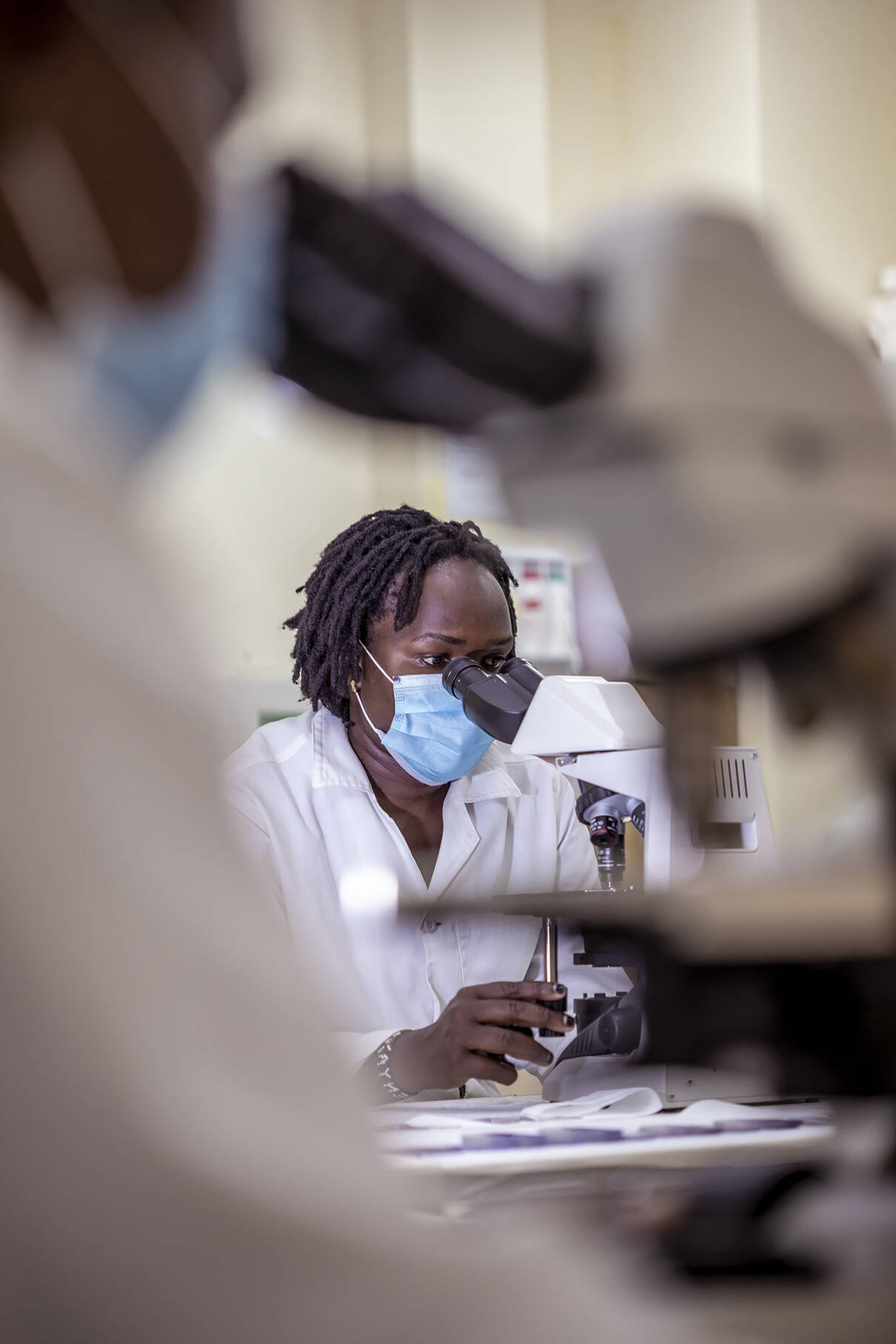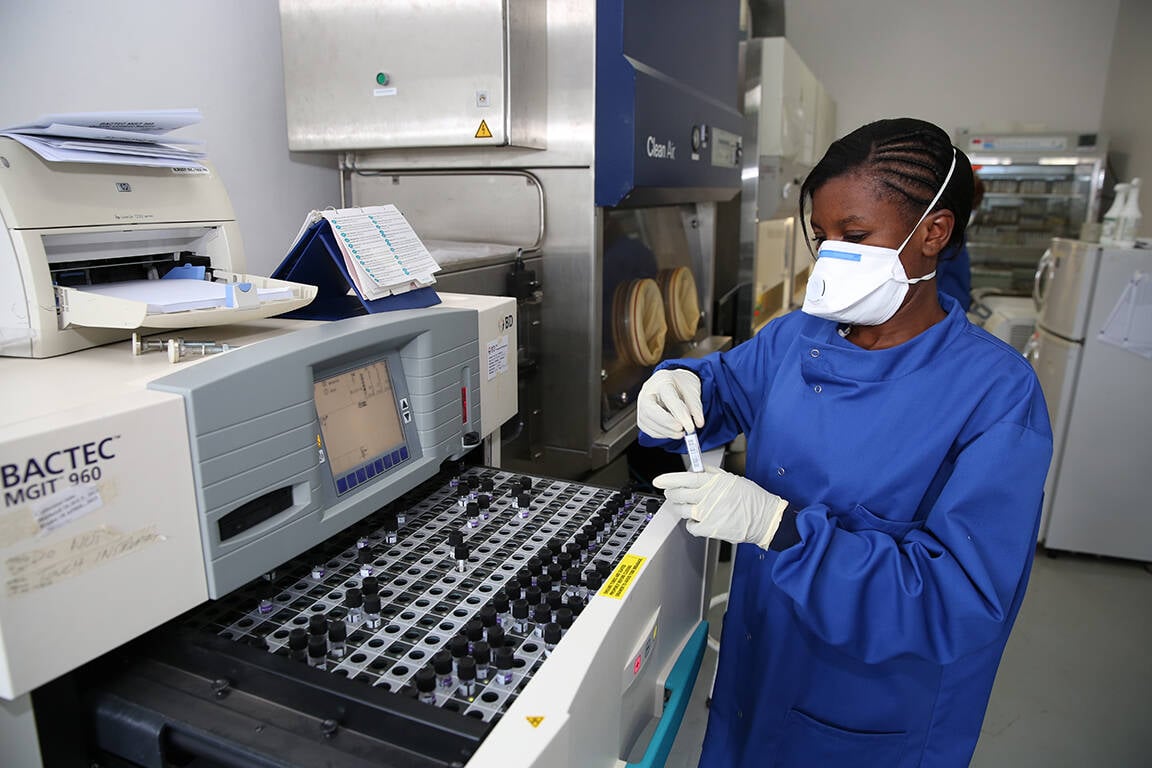Last year saw an acceleration in EDCTP-funded activities as the disruption caused by the COVID-19 pandemic began to subside. The stories in this Annual Report highlight just a small selection of the progress being made across our areas of interest. The global response to the pandemic has illustrated the power of research and innovation to tackle public health issues. The challenge now is to build on this experience and momentum to accelerate efforts to control the other infectious disease threats facing sub-Saharan Africa.

“EDCTP2 funding and other activities have been shaped by a very clear set of objectives, with explicit numerical and qualitative targets. In most cases, EDCTP performance is far surpassing expectations..”
— Dr Michael Makanga
Foreword
scroll down
Excellence, equity and impact
The foundations of success
Underpinning this success has been the unique approach adopted by EDCTP. Partnerships lie at the heart of our activities. The overwhelming majority of our grants support goes to international collaborations, but on top of that EDCTP seeks to work with like-minded partners to ensure activities are aligned, duplication avoided, and activities build on and extend each other.
EDCTP has always been committed to scientific excellence. High-quality research is the most efficient way to generate the evidence needed to evaluate medical interventions and ensure that they are effective and safe. Poor quality science wastes valuable resources and risks exposing people to unsafe or ineffective interventions. However, EDCTP combines this principle with that of equity, recognising that some individuals, institutions and countries may have the potential to carry out high-quality research but in practice lack the training, infrastructure and experience. Central to EDCTP’s work has been expanding the number of people, institutions and countries able to carry out high quality clinical research in Africa, through networking and targeted capacity building.
On a global scale, our funds are limited, and we have sought to maximise our impact by establishing a clear niche. This includes a focus on wider capacity-building as well as individual clinical studies, on priority infectious diseases affecting sub-Saharan Africa, and on key populations, including infants and children, pregnant women, and people with co-infections and co-morbidities, who are often excluded from clinical trials.
A further important aspect of EDCTP’s work is its particular interest in late-stage (phase II and III) clinical studies and post-licensing implementation studies, dovetailing with organisations that focus on earlier stages of intervention development. This focus also recognises the need for an ‘end to end’ perspective on product development, including the chaperoning of innovations through the entire development pathway, licensing and implementation within national health systems.
Nine years since its launch, EDCTP2 is already achieving its objectives – successfully advancing the development of medical interventions and building sustainable clinical research capabilities in sub-Saharan Africa.

Dr Michael Makanga
EDCTP Executive Director

Coordination of European activities has been a further EDCTP objective. An additional €1.2 billion has been committed to EDCTP-aligned projects by EU member states through Participating States-Initiated Activities (PSIAs). A total of 19 European countries are partners in EDCTP projects, in comparison to 16 in EDCTP1.
The fourth EDCTP objective relates to strengthening of external partnerships. Committed contributions to EDCTP from African countries through the PSIA mechanism have increased to €67 million (target: €30 million), and two new sub-Saharan African countries – Côte d’Ivoire and Kenya – have joined the EDCTP Association.
In terms of third-party public or private funding, €26.9 million has been provided through joint and coordinated calls and €374.0 million through strategic calls. The target of €500 million is likely to be reached once other contributions to clinical studies and fellowship projects have been accounted for.
The final EDCTP objective relates to EU cooperation and coordination with development assistance agencies. Four calls have been launched with development cooperation partners and co-funding has been secured with a range of agencies, including USAID, Unitaid, Gavi, the Vaccine Alliance, and Médecins Sans Frontières (MSF). Multiple strategic partnerships have been established with development partners in Africa, including the African Union, with EDCTP recognised by the Advisory Group on Research and Innovation for Africa-Europe Cooperation as “the most cited joint programme strengthening health research and health systems in Africa and the flagship EU–Africa partnership in health R&D cooperation, with large successful long-lasting research networks”.
Of critical importance, EDCTP-funded studies are beginning to generate essential evidence on the safety and efficacy of interventions. This Annual Report includes some key examples, including:
- The validation of a refined treatment for cryptococcal meningitis, a leading cause of death in people living with HIV, which has already led to a change in WHO recommendations.
- Confirmation of the safety and efficacy of a formulation of praziquantel suitable for young children, which will enable them to benefit from mass drug administration campaigns to control flatworm parasite infections.
- The phase II trial of a malaria vaccine that for the first time achieved the WHO’s 75% efficacy target.
These and other projects are likely to have a major impact on the health of African populations, and particularly African children.
A second key EDCTP objective relates to capacity building and collaboration. As well as being an important element of clinical trial projects, capacity building is also supported through specific projects – 295 of which have been funded to date, well above the target of 74 capacity-building activities. A total of 44 African countries are partners in EDCTP2 projects, more than the 33 targeted. Ethics and regulatory capacity building projects have been funded in 37 sub-Saharan African countries and regulatory systems are being strengthened in 28 countries.
Human capacity building is a critical EDCTP focus. As well as 205 fellows, EDCTP is supporting more than 600 trainees (master’s and PhD students), as well as 150 epidemiologists and biostatisticians through a partnership with the African Centres for Disease Control and Prevention (Africa CDC), and more than 36,000 individuals are benefiting from short-term training. Again, these numbers far exceed initial targets.
Achieving objectives
EDCTP2 funding and other activities have been shaped by a very clear set of objectives, with explicit numerical and qualitative targets. In most cases, EDCTP performance is far surpassing expectations.
Our first objective relates to the advancement of medical interventions. Our initial aim was to launch one phase III clinical trial a year. In reality, we have supported 39 phase III trials. Furthermore, while our ambition was to fund 150 clinical trials in total, our portfolio now extends to 332 clinical studies, including 213 clinical trials.
EDCTP2 also aimed to promote African scientific excellence and leadership of clinical studies. A third of the clinical projects have an African coordinator managing the grant, and all studies within host countries are led by African investigators. More than half of the value of grants awarded (55%) has been allocated to Africa and 62% of publications have a first or last author from an African institution.
The programme also had a goal to generate at least 1000 peer-reviewed papers. More than 500 have been published to date and, with many studies yet to finish, this target is also likely to be surpassed. Achievement of a further goal, to reduce the time to completion of trials, has been hampered by COVID-19, which disrupted many clinical trial activities.
Launched in 2014, the second EDCTP programme (EDCTP2) has invested more than €800 million – from the centrally managed funds – in projects that have the ultimate goal of enhancing the health and wellbeing of people living in sub-Saharan Africa. The majority of this funding, €684.5 million, is supporting 140 international collaborative clinical research projects, including clinical trials of interventions targeting the region’s most important infectious disease challenges – HIV/AIDS, TB, malaria, lower respiratory tract infections (LRTIs), diarrhoeal diseases and emerging infections, including Ebola and COVID-19. A further €85 million has been committed to projects building clinical research and creating an enabling environment for research, and €44.5 million is dedicated to fellowship programmes supporting the research leaders of today and of the future.
These activities have brought together researchers and research institutions from 29 European countries and 44 countries in sub-Saharan Africa. As well as African countries with a well-established clinical research infrastructure, projects have embraced nations with limited past experience of research but a high burden of disease. While research excellence has been a central principle of EDCTP2 activities, schemes have been organised to build the research capacity of countries with less experience of clinical research, for example through partnering with centres of excellence in Africa and Europe, so they are better able to compete for funding.
